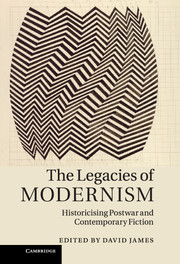Book contents
- Frontmatter
- Contents
- Notes on contributors
- Acknowledgements
- Introduction: mapping modernist continuities
- Part I Early legacies: inheriting modernism at mid century and beyond
- Part II Modernist aesthetics in transition: character, perception, innovation
- Part III Reassessing the ethics of modernist fiction
- Part IV Modernism's global afterlives
- Epilogue Finding the dreadfully real
- Index
- References
Epilogue - Finding the dreadfully real
Published online by Cambridge University Press: 05 November 2011
- Frontmatter
- Contents
- Notes on contributors
- Acknowledgements
- Introduction: mapping modernist continuities
- Part I Early legacies: inheriting modernism at mid century and beyond
- Part II Modernist aesthetics in transition: character, perception, innovation
- Part III Reassessing the ethics of modernist fiction
- Part IV Modernism's global afterlives
- Epilogue Finding the dreadfully real
- Index
- References
Summary
Some thirty-five years ago, sitting in a National Express coach on the M4 and reading Virginia Woolf's The Years (1937), I decided that the most enviable job in life was to create a parallel reality in words. I was in no doubt then, aged nineteen, that the novel was a parallel reality, a kind of smoky alter-ego of the real world and its apodictic ordinariness: Hamlet's mirror up to nature, in fact, although Alice's walk-through mirror held out the possibility that the rules might be changed, as in dreams. At that youthful time, despite a sixth-form foray into Beckett's plays and T. S. Eliot's The Waste Land (1922), epistemological difficulties were not even a cloud on my horizon. The relation between reality and fiction seemed straightforward: you observed, you recorded, you did your best to remould life in words' clay using the imagination. Fidelity was the watchword, rather than fantasy. The process seemed to me little short of miraculous, my own adolescent attempts so far producing nothing but a kind of crude puppetry.
The Years is unusual in Woolf's otherwise modernist oeuvre: a late work and the last to be published in her lifetime, it is in the third person, works on a broad social canvas, is Galsworthian or even Trollope-like in its three-generational account of one family, the Pargiters, and pursues a chronological linearity and frame (featuring a single day of each of the eponymous years) of coach-route reliability. It is, I suppose, a realist novel, and what impressed me most about it was its sensual representation of life's complexity, whether the snowy light on stained bathroom enamel, middle-class awkwardness or tolling bells (‘the walloping Oxford bells, turning over and over like slow porpoises in a sea of oil’). As William Golding said of Trollope: ‘[He] was interested in how things are. He could pass a very pleasant life without worrying how things were, what they had been and what they would become. He was not much interested in meaning.’ Woolf worried about meaning, it tormented her, but the part of her that watched, that noticed people and things in exquisite detail, that could transpose all this into prose rich with a kind of casual poetry, that was the part I most wanted to imitate.
- Type
- Chapter
- Information
- The Legacies of ModernismHistoricising Postwar and Contemporary Fiction, pp. 264 - 282Publisher: Cambridge University PressPrint publication year: 2011



